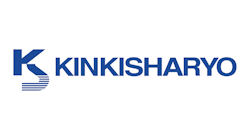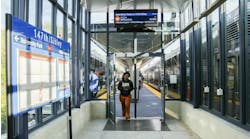LA Metro Gold Line Foothill Extension to Open March 5
On Oct. 22, Phillip A. Washington, CEO for the Los Angeles County Metropolitan Transportation Authority (Metro) announced that the Metro Gold Line Foothill Extension Project, the very first rail line funded and built thanks to the 2008 Measure R countywide sales tax, will officially open to the public on March 5.
The $1 billion project will extend the Metro Gold Line from its current terminus at Sierra Madre Villa Station approximately 12 miles east to Azusa, with new station stops at Arcadia, Monrovia, Duarte/City of Hope, Irwindale, Azusa Downtown and APU/Citrus College. The line is anticipated to carry 13,600 riders on a daily basis, with trains operating every 12 minutes during peak hours.
“The opening of the Metro Gold Line Foothill Extension will bring Metro Rail to new San Gabriel Valley communities, and provide a relief valve for the increasingly congested 210 freeway,” said L.A. County Supervisor and Metro Board Chair Mark Ridley-Thomas. “Its opening is a significant milestone: Metro is delivering on its promise to lead a transit revolution. Work is well underway to add four additional rail lines and a total of 32 new miles of service to L.A. County’s rail system in the coming years.”
The rail extension was built by the Metro Gold Line Foothill Extension Construction Authority, an independent transportation planning and construction agency. The line took approximately five years to build, with major construction completed in September.
“Our testing and training process before we open any rail line is a big part of making safety Metro’s number one priority,” Washington said. “But once the Gold Line Extension opens to the public in March it will be yet another example of our regional investment in transforming transportation across this region.”
Metro has now accepted delivery of the rail line extension, and will require the next several months to complete rigorous pre-revenue operations testing to ensure the line is safe and ready for service. This precursor work is critically important for the successful launch of the rail line. Metro is testing the line, training operators, supervisors and maintenance personnel, and will conduct extensive community outreach to help keep pedestrians, bicyclists and motorists safe around passing trains.
For example, Metro will test its fleet of brand new Kinkisharyo train cars as part of its pre-revenue service operations. The brand new P3010 train cars will seat 68 passengers and are highly advanced stainless steel vehicles specifically designed to support Metro’s complex system expansion needs. Metro has already begun train testing on the alignment, and will accelerate train testing frequencies in preparation for the opening. New rail cars must be tested and go through a “burn-in” process, with each car needing to run on the tracks for 1,500 miles.
In addition to the trains themselves, Metro also will test 23 miles of main train track. Tracks traverse 24 bridges and 14 at-grade street crossings. Metro must also test power and substation components in a simulated revenue service environment. Integrated testing will ensure that all systems, from power, communications, signals, and grade crossings are all operating properly.
What’s more, on July 24 of this year, Metro accepted the new $265 million 24-acre operations facility in Monrovia that will house up to 84 light rail vehicles. Nearly 200 employees are scheduled to work at this single facility that will operate on a 24/7 basis.
During these pre-revenue testing and training operations, the public is advised to “Stop, Look and Listen” as test trains begin moving regularly through San Gabriel Valley communities for the very first time. Motorists are encouraged to be alert and watch for the presence of trains. Drivers should keep clear of closed crossing gates and look both ways before crossing the tracks. Pedestrians, bicyclists and motorists should adhere to all posted “No Right Turn on Red” signs.
Metro has posted 24 safety ambassadors along the alignment from 6 a.m. to 6 p.m. Monday through Friday to help people cross safely. Ambassadors are retired bus and rail operators who are fully trained in safety rules and regulations. They will assist pedestrians, bicyclists and motorists at crossings, answer safety questions, observe unsafe situations and report safety-related issues to the agency.


